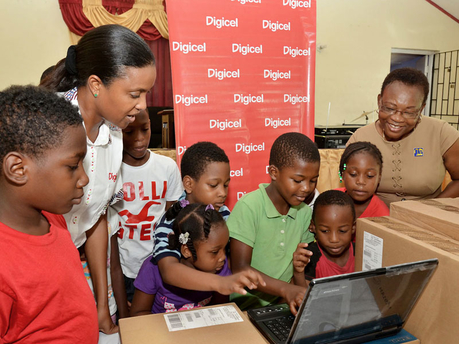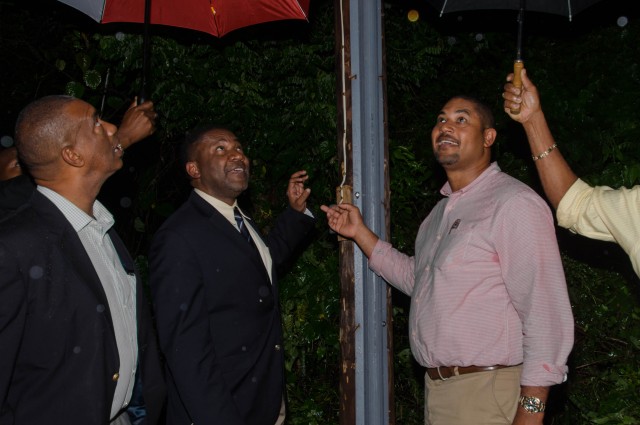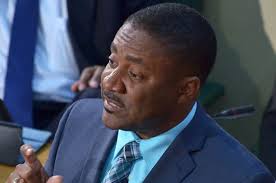KINGSTON, Oct. 12 (JIS) BY: CHRIS PATTERSON – Joyous shouts and cheers filled the atmosphere in Treadways, recently as residents of the St. Catherine-based community showed their appreciation for the opening of an internet café.
Not even the onset of afternoon showers, could put a damper on the celebratory mood of the residents, scores of whom turned out to witness the official opening of the approximately $300,000 facility.
The café, which is intended to benefit residents of Treadways and neighbouring communities, is located on the grounds of the Treadways Gospel Assembly.
The initiative is one of the four projects undertaken by Civil Servant of the Year 2013-14 and Director of Productions at the Jamaica Information Service (JIS), Enthrose Campbell, under the theme ‘Transformation and Renewal for a Better Tomorrow’.
The Treadways internet café project is supported by Digicel, which donated computers, desks, and chairs. The facility is equipped with two desktop computers, two laptop computers, a multipurpose printer, and wall posters, and will also serve as a homework centre.
In expressing gratitude for the gift, church member, Stephaney Rankine, vowed to take care of the facility.
Ms. Rankine, who is also a teacher at the Ewarton Primary School in St. Catherine, urged the community members to use the facility to empower themselves.
Community member, Judith Higgins, said the facility’s establishment will not only encourage more young people to attend church, but will also allow them to conduct research.
Another community member, Isorene Morrison, said the café will be used by her grandchildren, pointing out that the initiative is a “wonderful thing”.
In his remarks, Science, Technology, Energy, and Mining Minister, Hon. Phillip Paulwell, who was guest speaker at the function, said the initiative supports the Government’s thrust to increase access to broadband services.
He said the establishment of internet cafés, supported by citizens and members of the private sector, along with the Community Access Points (CAPs) that the Government is putting place, will further advance this mission.
“What we want to see is what Enthrose is doing here today. How we are going to get our people to have access to the technology that will enable us to develop ourselves, that will enable us to be a part of this global village, that sees information (not only) as a valuable tool for learning but also as a tool for earning,” he said, adding that the facility’s location will bring people, especially youngsters, closer to the church and to God.
CAPs enable community members to use the internet at minimal or no cost for research, bill payments, education, communication, business, marketing, and social networking.
In the meantime, the Minister committed to “match what Digicel has done”, as well as provide Internet and WiFi services for two years, free of charge.
He said that this, however, hinges on how well the facility is maintained, pointing out that a site visit will be conducted in two months to ensure that the standards up to par.
Providing an overview on the project, Ms. Campbell informed that having selected four projects to undertake during her tenure, she was adamant, despite the challenges faced, that they would be completed.
“People were saying ‘Enthrose, you really should just take one project and focus on it because you are going to stretch yourself too much’. But I said to myself, that that would be a dilemma for me to select one of my four projects, because which one would I give up?” she said.
The projects included: a public sector empowerment programme; teaching CXC Spanish classes to St. Andrew Technical High School students, as well as teaching Spanish classes to Customs Officers; a series of features on excellent civil servants; as well the internet café at Treadways.
“I thought that these projects were planted in my heart and each of them was conceived with love and in addition they were planted by the Father,” she said, adding that the decision was made to pursue them all.
Ms. Campbell said the café location was identified following discussions with her neighbour, friend, and pastor of the Treadways Gospel Assembly, Elder Courtney Lyn.
“This internet café was born out of a desire to give back something to the community. I don’t live in Treadways, I don’t work in Treadways, but Treadways is my community. It is your community, Treadways is our community,” she said.
Ms. Campbell commended Digicel and the JIS for the work they have done to ensure the project’s fruition.
She noted that even though the project may be small, “it is a start” for greater things, and used the opportunity to encourage others to support the initiative.
In his remarks, Elder Lyn said the initiative is timely and will assist the students and community members in conducting research, among other things.
For her part, Senior Corporate Relations Manager at Digicel, Tricia Williams-Singh, said her company will continue to support extraordinary relationships especially those that seek to provide internet facilities across the length and breadth of the island.
Lauding the initiative, Director, Employee Relations and Benefits, Ministry of Finance and Planning, Erica Barnes, said it is one of the best projects undertaken by any person who has copped the Civil Servant of the Year award.
The multipurpose printer in the computer room was donated by Director, Open Wave Information Security, Andrew Nooks, while the posters were donated by the Jamaica Information Service.


 Caribbean News1 week ago
Caribbean News1 week ago
 Caribbean News7 days ago
Caribbean News7 days ago
 Caribbean News1 week ago
Caribbean News1 week ago
 Caribbean News1 week ago
Caribbean News1 week ago
 Bahamas News7 days ago
Bahamas News7 days ago
 News7 days ago
News7 days ago
 Bahamas News1 week ago
Bahamas News1 week ago
 News7 days ago
News7 days ago
















